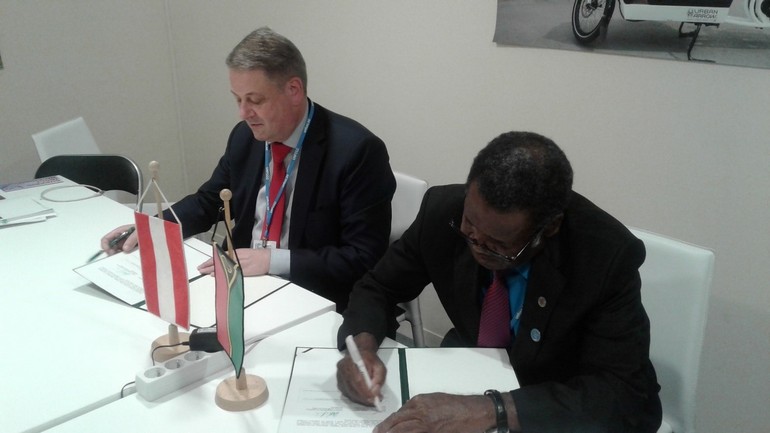At a signing ceremony on the margins of the recent UN Climate Change Conference (COP22) in Marrakech, the Austrian Federal Ministry for Agriculture, Forestry, Environment and Water Management and the Ministry of Climate Change of Vanuatu signed a funding agreement amounting to $1 million to electrify rural areas.

The Nationally Appropriate Mitigation Action (NAMA) on “Rural Electrification in Vanuatu” aims to boost sustainable income generation through access to clean energy for both men and women in Vanuatu’ rural areas in the aftermath of Cyclone Pam. The interventions thereby strive for a careful balance between stimulating local, inclusive economic growth while helping to rebuild the human, natural, physical, financial, and social assets of the affected population.
Through the support of the Austrian government, first investments will focus on extending access to clean energy through micro-grids and grid extensions in rural areas. The agreement will also fund capacity building for Vanuatu’s institutions to establish an adequate framework for the implementation of the NAMA. In particular, the Austrian-funded project elements will include the following three components:
- Investment into 1-2 grid extensions for two islands
- Investment into 1 micro-grid in one community
- Capacity building to provide the framework for NAMA implementation
The importance of clean energy access for Vanuatu’s recovery and sustainable development
Rural electrification is a key priority for the Republic of Vanuatu. Only one third of Vanuatu’s households have access to electricity, most of which are connected to the government regulated grid in the two main urban areas, Port Vila and Luganville. In rural areas, however, where 75% of Vanuatu’s households are located, energy poverty is even more pronounced: there, only one sixth of the households and less than half of the schools have access to electricity. With an overall electrification rate of just 17% in rural areas, Vanuatu has therefore about the same level of rural electrification as the most underdeveloped countries of sub-Saharan Africa.
Access to energy, which is a critical condition for economic growth, has become even more pressing as Vanuatu is still suffering from the devastating effects of Cyclone Pam in 2015, which led to a staggering drop of 50% in its GDP. Vanuatu’s community infrastructure was extensively damaged or destroyed, disrupting the daily life of people and requiring extra expenditures to repair or replace, precisely at a time when incomes have been lost. This destruction of livelihoods and local economies by Cyclone Pam has severely compromised the sustainable development benefits Vanuatu had previously achieved.
In pursuit of increasing access to clean energy, the Government of Vanuatu has already developed a number of government policies and national action plans, including the Government’s Priority and Action Agenda (PAA) 2006-2015, the National Energy Road Map (NERM), and the Scaling-up Renewable Energy in Low Income Countries Programme (SREP).
Project implementation
The project will be implemented by the Ministry of Climate Change (MCC) of the Government of Vanuatu, which will act as the NAMA Coordinating Authority. In that role, the MCC will supervise the preparation and implementation of the investment activities, supervise the disbursement of funds and carry out capacity building activities for setting up the NAMA framework.
The role of the NAMA Implementing Entity (NIE) will be taken over by the Department of Energy (DoE). As such, the DoE will develop the technical standards for equipment/installations used under the NAMA, and manage the preparation and implementation of investment activities and disbursement of funds from the Austrian Government and Kommunalkredit to the recipients. Further, it will also coordinate the promotion and awareness-raising campaigns and manage the monitoring activities and reports for the investments implemented under this project.
The NAMA was developed by the Government of Vanuatu and supported by the United Nations Development Programme (UNDP) in 2014 and 2015, thanks to the support of the Government of Australia. The specific costs for the grid extensions and mini-grids will be investigated in a feasibility study expected to be carried out in Q1/2017 and supported by UNDP, but which are expected to not exceed the overall budget of $1 million.
